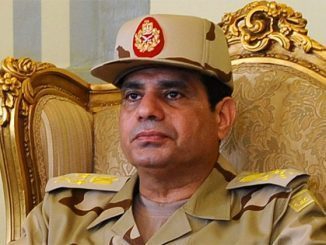
Dr. Mohamed Mahsoub, the former minister of state for parliamentary affairs during President Mohamed Morsi’s era, said that the Egyptian regime didn’t have the means to counter corruption either in the last decades or after al-Sisi military coup, but it had agencies to unveil corruption as the Central Auditing Organization (CAO) and the Administrative Control Authority(ACA),according to Al-Jazeera.
However, these agencies were constrained during Hosni Mubarak’s era as they revealed the corruption cases only to please the public opinion according to the regime’s desire.
Mahsoub added in a televised interview at “The Arab Reality” T.V Show on Al-Jazeera channel that after the military coup, Egypt returned back to the same practices that were implemented during Mubarak’s era, but in their new version.
He noted that the constitution of 2012 has stated in one of its articles the establishment of the national anti-corruption commission according to the United Nations treaty for anti-corruption but this article wasn’t mentioned in the constitution of 2014 that was passed after the military coup against Egypt’ first democratically elected President Mohamed Morsi.
According to Mahsoub, the absence of such committees infers the real target behind the military coup, “It isn’t only a struggle for power but also to control the Egyptian people’s wealth.”
In addition, Mahsoub said that Egypt is riddled with corruption and that the Egyptian authority doesn’t want to the fight corruption because the country is led for 20 years by “corruption “itself.
He also mentioned that corruption became more bold and vigorous after the military coup as it started to have its own approach that is completely overlapping with the authority. Moreover, Egypt’s budget has been directed completely toward corruption due to the lack of transparency and accountability.
In the same context, Journalist Salim Azouz said that the corruption has been related to Mubarak’s era, noting that he believes that “Al-Sisi is part of Mubarak’s era which has returned back again.” He added, “The Egyptian regime now protects corruption”, pointing to Hesham Genena, the former head of the Central Auditing Organization (CAO), or the “Anti-corruption czar “as named by the New York Times, who was dismissed from his position when he stated how much endemic graft had cost his country.
He also said that during Mubarak’s era, corruption cases were employed by one party of the authority against the other party only for settling accounts between them. The defendants were mainly submitted as scapegoats in front of the public opinion. “It’s noteworthy that al-Sisi regime is the one which issued the reconciliation law with corruption figures during Mubarak’s era,” said Salim Azouz.
Despite al-Sisi has announced that fighting corruption is a central policy after he came to power in 2013, but since then, his government has introduced a “reconciliation” law that has cleared the way for several Mubarak-era figures to have corruption convictions quashed in return for large cash payments.
On the contrary, Abdel-Fattah al-Sisi dismissed Hesham Genena from his position as head of the Central Auditing Organization last March after a commission investigated his report, concluding that Genena had misled the public. Genena had stated in the Egyptian media that the size of governmental corruption during the period between 2012 and 2015 amounted to EGP 600 billion ($67.7 billion). His statements were based on findings of a detailed study conducted by the CAO.
The state-owned and pro-regime media accused Genena of spreading false news and being a member of the Muslim Brotherhood.
Moreover, Genena and his family have been subject to a campaign of defamation on pro-government television channels in an effort to discredit him, ranging from accusations that he belonged to the Muslim Brotherhood to suggestions that his wife supported Hamas because she is of Palestinian origin.
Genena said that he was misquoted, that the figure covered four years and that it reached following an exhaustive study. A newspaper quoted him in December as saying corruption cost the country 600 billion Egyptian pounds ($67.6 billion) in 2015.
The former (CAO) was put on trial over the charge of spreading false news and disturbing the peace. On July 28, 2016, the New Cairo misdemeanors court has ruled in its meeting to punish Hesham Genena one-year imprisonment with labor.
The court ruled Genena a fine of 20,000 pounds and a bail of 10,000 pounds for spreading false news on the size of governmental corruption and for distorting the image of the Egyptian regime.
Genena has been succeeded by Hisham Badawi, who worked previously for Egypt’s state security apparatus. The agency has not announced any major new cases. In fact, Badawi is a regime figure and it’s more or less the same old wine.



